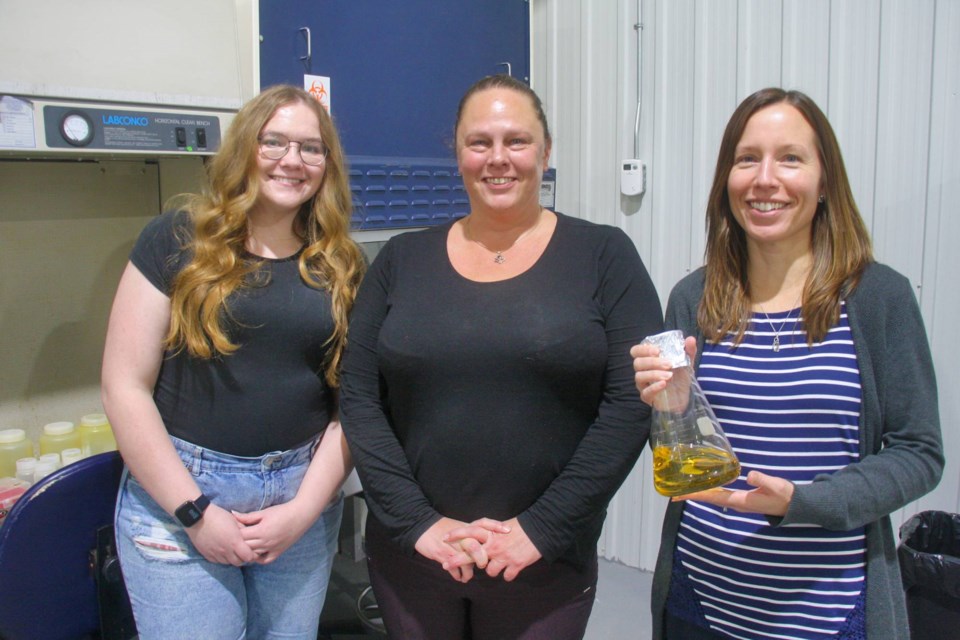What do site remediation and prize-winning pumpkins have in common? You might say the similarities are microscopic.
BioNorth Solutions is a Thunder Bay-based company that is quickly making a name for itself in microbial soil bioremediation and, recently, the plant growth industry. This “soil health and rehabilitation” company started in 2014, initially researching how bacteria can remediate soil contaminated with hydrocarbons such as oil used in industry and fossil fuels. The business is the brainchild of Amber Kivisto and Miranda Lock who met at Lakehead University during their post-grad studies in biology.
“She was my mentor,” Kivisto said. “We got along well as friends, so we said, OK, let’s start a business together.”
Kivisto had business experience from a previous company and Lock, BioNorth Solutions’ chief science officer, received her PhD in environmental biotechnology. For several years, the company experimented with hydrocarbon soil remediation solutions to develop a product called Microbiate SG, which contains locally occurring bacteria. Tiny microbes literally eat the hydrocarbons, breaking down the molecular structures to convert them into smaller, more inert molecules such as oxygen, water, and small amounts of carbon dioxide.
The other byproduct: more bacteria. That means remediation can start with a very small amount of the product and still be highly effective over time. Only 678 grams or about 1.5 pounds of Microbiate SG are needed per cubic metre of contaminated soil, Kivisto said.
“Lots of the work we do is on First Nations,” Kivisto said.
Diesel contamination from generators in off-grid fly-in communities can be a big problem. Often, remediation means filling sandbags and trucking it out by ice road or air. BioNorth’s solution reduces environmental impact and cost in several ways.
“We can keep the natural soil from that site on that site. That’s a great thing, both culturally and with the expense.”
Using microbes to remediate hydrocarbons such as gasoline and diesel is not new. One thing that makes BioNorth Solutions different though is that it works with clients during remediation and customizes products based on soil results rather than ship a one-size-fits-all product.
“We are really a science- and data-driven company,” she said. “When we’re doing a bigger project, we review the engineering reports and give our recommendations on product, dosage, and how to apply. Then, we’ll follow along throughout (the remediation process). So we’re much more collaborative with our end users and engineering companies.”
Want more business news from the North? Subscribe to our newsletter.
The other major difference between BioNorth Solutions and its competitors is the company’s “cold-adapted” microbes. Most bacteria-based remediation products on the market today are produced in U.S. southern states, where soil normally doesn’t freeze. The colder climate in Canada greatly reduces the bacteria’s efficiency.
“If you’re looking at something from South Carolina, that’s starting to wake up at 15 degrees and is working more effectively at 25-plus.”
The bacteria can actually die off at lower temperatures, so ultimately it may not be effective at all.
BioNorth’s cold-adapted microbes, on the other hand, survive and thrive at much lower temperatures.
“They’ll hibernate over the winter, and then wake up when the frost comes out. They work slowly until about 7 degrees, and then they pick up their pace a bit. Between 15 and 25 degrees is their sweet spot when they’re most active.”
It’s also an organic solution. Unlike chemicals and additives, the bacteria used are completely harmless to the environment — including people.
A new BioNorth product currently going through the registration process is PGP or Plant Growth Promotion which also uses bacteria.
“Over-fertilizing is the problem,” Kivisto said. “The plants can only take up so much, so the soil gets sterile because of an excess of phosphorus or an excess of nitrogen. It can also affect the electrical conductivity of the soil, which takes forever to get back.”
PGP doesn’t eliminate fertilizer, but it does reduce the amount of fertilizer needed, working in tandem with it. Here again, PGP helps reduce costs and the impact on the environment.
“It’s not necessarily a replacement. Horticulturists might see, for example, tomatoes where the leaves are too green,” Lock said, adding that fertilizer can help regulate that.
PGP means they need less fertilizer. The microbes encourage root hair growth to increase uptake of water and nutrients — including nutrients from fertilizer.
“They can peel back their fertilizer use because the PGP is making the fertilizer better available.
“It’s hormones — chemicals that basically tell the plant (to grow more root hairs),” Lock said.
As with its hydrocarbon remediation products, BioNorth’s PGP is different from the competition since its cold-adapted bacteria are better acclimatized to northern soils. Also similarly to Microbiate SG, very little is needed — about 25 grams per acre, Kivisto said. Once approved for market, PGP might be used in four different scenarios: large-scale corn and canola farmers, organic home growers, revegetation (for example, mine sites), and the lawn and landscape industry.
“It works really well with grass,” Kivisto said. “It helps the grass seed to germinate quickly and grow significantly better.”
BioNorth Solutions’ PGP won a RBC Innovation Award from the Northwestern Ontario Innovation Centre for Innovative Project of the Year this past November. The organization recognized PGP for the “immense” societal impact it has. Kivisto said PGP will be available by spring 2024.




